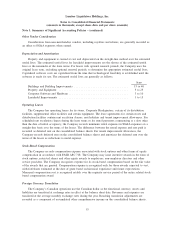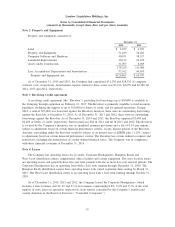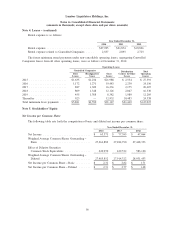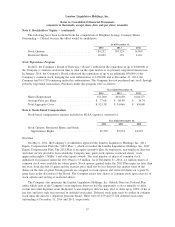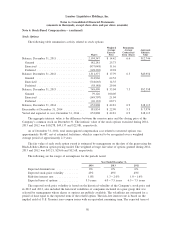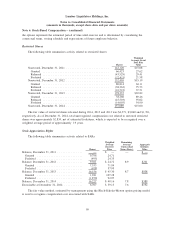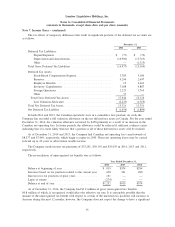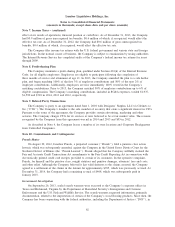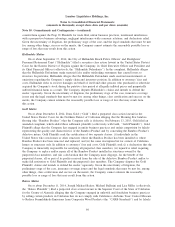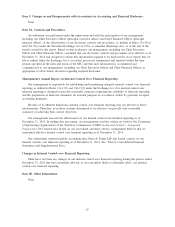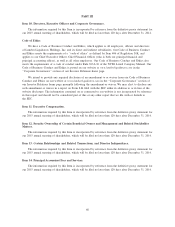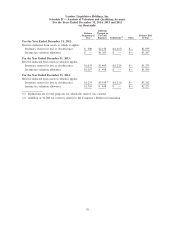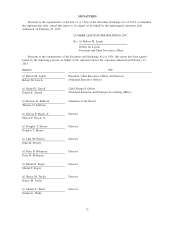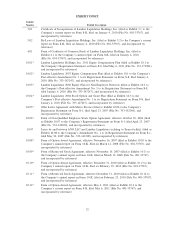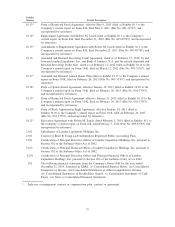Lumber Liquidators 2014 Annual Report Download - page 71
Download and view the complete annual report
Please find page 71 of the 2014 Lumber Liquidators annual report below. You can navigate through the pages in the report by either clicking on the pages listed below, or by using the keyword search tool below to find specific information within the annual report.Lumber Liquidators Holdings, Inc.
Notes to Consolidated Financial Statements
(amounts in thousands, except share data and per share amounts)
Note 10. Commitments and Contingencies − (continued)
their investigation. In recent communications, the DOJ indicated that it is contemplating seeking criminal
charges under the Lacey Act. The Company expects to continue to communicate with the DOJ regarding its
intentions and possible courses of action in this matter. At this time, the Company does not have enough
information to estimate a reasonably possible loss or range of loss that may result from actions by the DOJ as
a result of its investigation.
Kiken Matter
On or about November 26, 2013, Gregg Kiken (‘‘Kiken’’) filed a securities class action lawsuit, which
was subsequently amended, in the United States District Court for the Eastern District of Virginia against the
Company, its founder, Chief Executive Officer and President, Chief Financial Officer and Chief Merchandising
Officer (collectively, the ‘‘Kiken Defendants’’). In the amended complaint, Kiken and an additional plaintiff,
Keith Foster (together with Kiken, the ‘‘Plaintiffs’’), allege that the Kiken Defendants made material false
and/or misleading statements and failed to disclose material adverse facts about the Company’s business,
operations and prospects. In particular, the Plaintiffs allege that the Kiken Defendants made material
misstatements or omissions related to the Company’s compliance with the federal Lacey Act and the chemical
content of certain of its wood products. In addition to attorneys’ fees and costs, the Plaintiffs seek to recover
damages on behalf of themselves and other persons who purchased or otherwise acquired the Company’s
stock during the putative class period at allegedly inflated prices and purportedly suffered financial harm as a
result. The Company disputes the Plaintiffs’ claims and intends to defend the matter vigorously. Given the
uncertainty of litigation, the preliminary stage of the case, insurance coverage issues and the legal standards
that must be met for, among other things, class certification and success on the merits, the Company cannot
estimate the reasonably possible loss or range of loss that may result from this action.
TCPA Matter
On or about March 4, 2014, Richard Wade Architects, P.C. (‘‘RWA’’) filed a lawsuit in the United States
District Court for the Northern District of Illinois (the ‘‘RWA Lawsuit’’), which was subsequently amended,
alleging that Lumber Liquidators violated the Telephone Consumer Protection Act (‘‘TCPA’’), the Illinois
Consumer Fraud Act and the common law by sending an unsolicited facsimile advertisement to RWA.
RWA seeks recourse on its own behalf as well as other similarly situated parties that received unsolicited
facsimile advertisements from the Company. The TCPA provides for recovery of actual damages or five
hundred dollars for each violation, whichever is greater. If it is determined that a defendant acted willfully or
knowingly in violating the TCPA, the amount of the award may be increased by up to three times the amount
provided above. Although the Company believes it has valid defenses to the claims asserted, based upon
the proceedings to date, at December 31, 2014, the Company has accrued $300, including $25 in the
fourth quarter of 2014, as its best estimate of the probable loss that may result from this action.
Prop 65 Matter
On or about July 23, 2014, Global Community Monitor and Sunshine Park LLC (together, the ‘‘Prop 65
Plaintiffs’’) filed a lawsuit, which was subsequently amended, in the Superior Court of the State of California,
County of Alameda, against the Company. In the complaint, the Prop 65 Plaintiffs allege that the Company
violated California’s Safe Drinking Water and Toxic Enforcement Act of 1986, Health and Safety Code
section 25249.5, et seq. (‘‘Proposition 65’’). In particular, the Prop 65 Plaintiffs allege that the Company failed
to warn consumers in California that certain of the Company’s products (collectively, the ‘‘Products’’) emit
formaldehyde in excess of the applicable safe harbor limits. In addition to attorneys’ fees and costs, the
Prop 65 Plaintiffs seek (i) equitable relief involving the reformulation of the Products, additional warnings
related to the Products, the issuance of notices to certain of the purchasers of the Products (the ‘‘Customers’’)
and the waiver of restocking fees for Customers who return the Products and (ii) civil penalties in the amount
of two thousand five hundred dollars per day for each violation of Proposition 65. The Company disputes the
claims of the Prop 65 Plaintiffs and intends to defend the matter vigorously. Further, the Company has filed a
63


